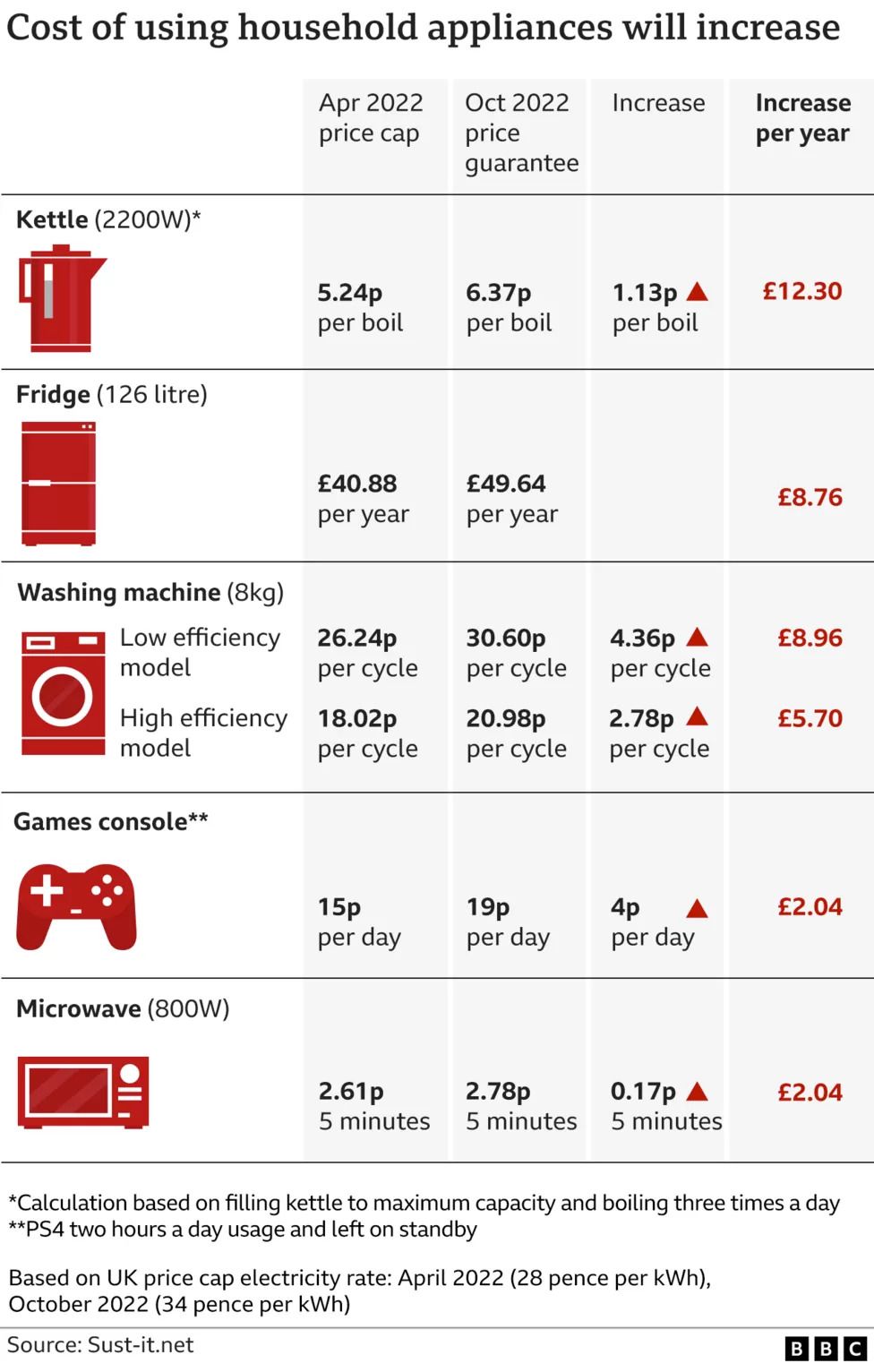
How to cut your energy bills
Energy-saving measures won't make up for the sharp rise in prices. But taken together, lots of small changes could save hundreds of pounds a year.
1. Use an air fryer or microwave instead of an oven
Ovens can be an inefficient way of cooking as they involve heating a relatively large space. Using a microwave, pressure cooker or air fryer instead could save money.
For example, since 1 October it costs 3p to heat up a frozen ready meal in a 800W (watts) microwave for seven minutes. It would cost 40p for 35 minutes in a 2000W oven, energy efficiency website Sust-it estimates.
Microwaves usually save energy as they cook faster. For example, a baked potato could take 90 minutes in an oven, 45 minutes in an air fryer and 10 minutes in a microwave.
2. Switch to LED lightbulbs
Lighting makes up 11% of the average UK household's energy consumption, according to The Energy Saving Trust and Which?
Switching to LED bulbs can make a big difference.
A household using a dozen 40W incandescent or halogen bulbs for four hours a day could spend about £238 per year, Sust-it estimates. LED equivalents would cost £41.70 - a saving of £196.30 a year.
LED bulbs can cost more, but have a longer lifespan and will save money over time.
3. Take control of your central heating
Set your thermostat at the lowest comfortable temperature (often 18 to 21C).
Turning your thermostat down just one degree could cut bills by about £145 a year, the Energy Saving Trust says. This is based on a semi-detached house with the heating on between 7am-9am and 4pm-11pm on week days and between 7am-11am at weekends.
In smaller homes, like a terraced house or a flat, the savings will be lower.

You can also turn the heating off in rooms you're not using.
Bleeding radiators to remove trapped air and moving furniture away from them helps warms air flow more easily around a room.
4. Insulate and draught-proof your home
If your home is poorly insulated it will lose heat more easily and be harder to keep warm.
Insulation and draught-proofing - to stop heat escaping around doors and windows - helps trap heat.
Professional draught-proofing might cost about £225, the Energy Saving Trust says. However, it can save about £125 a year - based on a typical semi-detached home.

DIY options like self-adhesive strips for window gaps and heavy curtains can also save you money.
"It's not necessarily going to be a huge cost saving, but what it will do is make your home feel more comfortable at a lower temperature," says Emily Seymour, sustainability editor at Which?.
Most heat is lost through the roof, so loft insulation should be a priority.
For renters, installing insulation may not be an option as landlords are responsible for major improvements. However, landlords can be fined for renting properties which don't meet minimum energy efficiency standards.
5. Make better use of appliances
Washing machines and tumble dryers can be energy hungry, according to Emily Seymour. But there are ways to use them efficiently, she says.
Use any eco settings and turn your machine down - particularly if clothes aren't that dirty.
Washing clothes at 30 C and using one less cycle a week could save £28 a year, the Energy Saving Trust says.

If you can, dry clothes outside instead of in a tumble dryer. It will cost at least £36 a year to run an energy efficient dryer from October, based on average usage, or as much as £159 for an inefficient models, Sust-it says.
Not using an inefficient dryer for four months during the summer could save up to £70 a year, according to the Energy Savings Trust.
6. Take shorter showers
A typical household with gas heating will see about 12% of its energy bill used to heat water for showers, baths and taps, the Energy Saving Trust says.
However, if you have a power shower the saving could be less as you'll use more hot water.
Meanwhile, cutting your shower time from eight to four minutes could save £70 a year. This is based on five showers a week.











